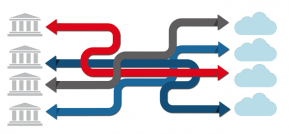Tight IT Budgets Could Slow Gov’t Clouds

The gears of government bureaucracy grind slowly, but gradually federal agencies are adopting cloud-based IT infrastructure and the enterprise tools it makes possible, according to a new market survey.
However, "stretched IT budgets" are slowing the shift to cloud-based services, according to Gartner Inc. The market researcher forecast this week that IT spending by federal and local governments around the world will decline 1.8 percent to $431 billion in 2015, but are expected to grow to $475.5 billion by 2019.
Along with budget shortfalls, Gartner identified the vast number of legacy IT systems that must be upgraded or replaced and the lack of critical IT skills as key challenges for government CIOs trying to shift operations to the cloud.
Given the varied types of private data handled by government agencies, security requirements differ from one agency to the next. A government healthcare exchange or a Pentagon database containing sensitive data requires stricter security than, say, a Commerce Department data bank containing everything from census data to weather and climate information.
Indeed, the Obama administration (despite its widespread application of government secrecy and secret legal justifications for broader government surveillance) has been championing an "open data" movement as a way to foster economic growth. In its survey of government IT spending trends, Gartner forecasts that more than 30 percent of digital government projects will be regarded as open data efforts. The problem, the survey warns, is that "open data is not free," and for most agencies the effort represents a cost center. Hence, agencies must find way to attach "value" to open data projects so that can become at least partially self-sustainable.
Federal agencies have for several years been stumbling toward cloud adoption via a certification program called FedRAMP, which stands for Federal Risk and Authorization Management Program. The program has so far approved 16 cloud systems that comply with federal regulations. Here's the list. These compliant systems offer either infrastructure-, platform- or software-as-a-service offerings.
According to the Gartner survey, the government "shift to Web-scale IT is a long-term trend with significant IT process, cultural and technology implications." The market watcher predicts that federal agencies adopting this approach "will largely eschew the acquisition of expensive, scalable computing, storage and networking resources in favor of lower-cost, open-source-derived hardware."
Hence, Gartner predicts, "traditional IT suppliers and delivery modes will become less relevant to government IT."
Meanwhile, hybrid cloud infrastructure appears to be tailor-made for federal agencies with plenty of on-premise IT infrastructure to manage along with emerging private cloud installations and greater reliance on public cloud vendors as the federal bureaucracy slowly gets its IT act together.
While hybrid IT is seen as the logical way to secure and manage government cloud operations as agencies like the Defense Department consolidate far-flung datacenters, the Gartner survey notes that cloud vendors must develop "very different competencies" to support public cloud deployments.
Meanwhile, big data is becoming synonymous with cloud deployment. Nowhere is that more true than the government cloud. Hence, Gartner predicts that federal agencies will make greater use of what it calls "edge analytics," defined as the pervasive applications of predictive algorithms and cognitive computing to enable real-time assessments of what will and should happen.
Related
George Leopold has written about science and technology for more than 30 years, focusing on electronics and aerospace technology. He previously served as executive editor of Electronic Engineering Times. Leopold is the author of "Calculated Risk: The Supersonic Life and Times of Gus Grissom" (Purdue University Press, 2016).










